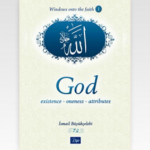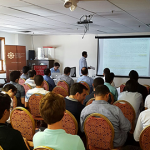Islam Addresses All Human Faculties
As is explicit in the abovementioned verse, the Messenger’s method of education does not just purify our evil-commanding selves; rather, it is universal in nature and raises human hearts, spirits, minds, and souls to their ideal level. He respected and inspired reason; in fact, he led it to the highest rank under the intellect of Revelation.
The universal truths of the Qur’an also state this fact. Moreover, the Message touches all of our inner and outer senses, makes its followers rise on the wings of love and compassion, and takes them to places beyond their imagination. His universal call encompasses, in addition to the rules of good conduct and spirituality, all principles of economics, finance, administration, education, justice, and international law. He opened the doors of economic, social, administrative, military, political, and scientific institutions to his students, whose minds and spirits he trained and developed to become perfect administrators, the best economists, the most successful politicians and unique military geniuses.
If there had been any lack in his teaching of humanity, the aim of his Prophethood could not have been realized so fully. He said:
Each Prophet before me built some part of this marvelous building, but there was a gap that needed to be closed. Every person passing by would say: “I wonder when this building will be completed.” The one who completes it is me. After me, there is no longer any defect in the structure. [1]
The Qur’an affirms this: This day I have completed your religion for you (5:3). In short, the Prophet reformed, completed, and perfected the ways of life that had been lacking, had become deficient, or had deviated from the Will of God.
All previous Prophets were sent to a certain people and for a fixed time. However, as God chose Prophet Muhammad and Islam for all times and peoples, Islam is the perfection of His universal favor upon His creation. He fashioned Islam in such a way that it pleases everybody. Therefore, rather than trying to find fault with the Message and the principles relayed by The Messenger, people should seek these truths and principles in order to design their lives according to them.
The Prophet was a man who completed, perfected, and reformed. He transformed an illiterate, savage people into an army of blessed saints, illustrious educators, invincible commanders, eminent statesmen, and praiseworthy founders of the most magnificent civilization in history.
An educator’s perfection depends on the greatness of his or her ideal and the quantitative and qualitative dimensions of his or her listeners. Even before Prophet Muhammad’s demise, the instructors and spiritual guides he dispatched were traveling in a vast area stretching from Egypt to Iran and from Yemen to Caucasia for the sole purpose of spreading what they had learned from him. In succeeding centuries, peoples of different traditions, conventions, and cultures—Persians and Turanians, Chinese and Indians, Romans and Abyssinians, Arabs and some Europeans—rushed to his Message.
An educator’s greatness also depends on the continuation of his or her principles. No one can deny that people all over the world accept his Message and adopt his principles. By God’s Will and Power, most of humanity will embrace Islam in the near future.
Remember that The Messenger appeared among a wild and primitive people. They drank alcohol, gambled, and indulged in adultery without shame. Prostitution was legal, and whorehouses were indicated by a special flag. Indecency was so extreme that a man would be embarrassed to be called a man. People were constantly fighting among themselves, and no one had ever been able to unify them into a strong nation. Everything evil could be found in Arabia. However, the Prophet eradicated these evils and replaced them with such deeprooted values and virtues that his people became the leaders and teachers of the civilized world.
Even today we cannot reach their ranks. This has been acknowledged by such Western intellectuals as Isaac Taylor, Robert Briffault, John Davenport, M. Pickhtal, P. Bayle, and Lamartine. [2]
God creates living things from lifeless things. He grants life to soil and rock. The Prophet transformed “rocks, soil, coal, and copper” into “gold and diamonds.” Just consider the cases of Abu Bakr, ‘Umar, ‘Uthman, ‘Ali, Khalid, ‘Uqba ibn Nafi’, Tariq ibn Ziyad, Abu Hanifa, Imam Shafi’i, Bayazid al-Bistami, Muhyi al-Din ibn al-‘Arabi, Biruni, Zahrawi, and hundreds of thousands of others, all of whom were brought up in his school. The Messenger never allowed human faculties to remain undeveloped. He developed them and replaced weakness with marvelous competency. As a great thinker recalled:
‘Umar had the potential to be a great man even before he embraced Islam. After his conversion, he became a powerful yet very gentle man who would not step on an ant or kill even a grasshopper. Such was his compassion, sensitivity, and understanding of justice and administration that he used to say: ‘If a sheep falls into the Tigris because of a destroyed bridge, God will ask me about it.’
We cannot eradicate such a small habit as smoking, despite all our modern facilities and practically daily symposia and conferences to combat it. Medical science says smoking causes cancer of the larynx, mouth, esophagus, windpipe, and lungs; however, people insist on smoking. On the other hand, the Messenger eradicated countless ingrained bad habits and replaced them with laudable virtues and habits. Those who saw them used to say: “My God, his followers are superior even to the angels.” When these people pass over the Bridge above Hell with their light spreading everywhere, even the angels will ask in awe: “Are they Prophets or angels?” In fact, they are neither Prophets nor angels; they are the educated people of the nation of Prophet Muhammad.
Prophet Muhammad had a holistic view of each individual. He took all of their mental and spiritual capacities and developed them, turning his own wretched people into paragons of virtue. His wisdom in assessing such potential is another proof of his Prophethood.
[2] To give just one example, Lamartine asks: “Philosopher, orator, apostle, legislator, warrior, conqueror of ideas, restorer of rational dogmas, of a cult without images; the founder of twenty terrestrial states and of one spiritual state, that is Muhammad. As regards all standards by which human greatness may be measured, we may well ask: Is there any man greater than he?” (Historie de la Turquie, vol. 2, pp. 276–7.) (Tr.)
Related Posts
- January 25, 2014
- 0 Comment









